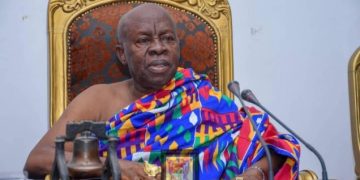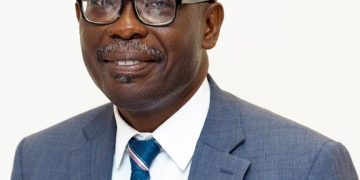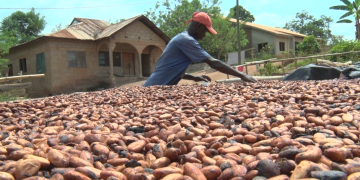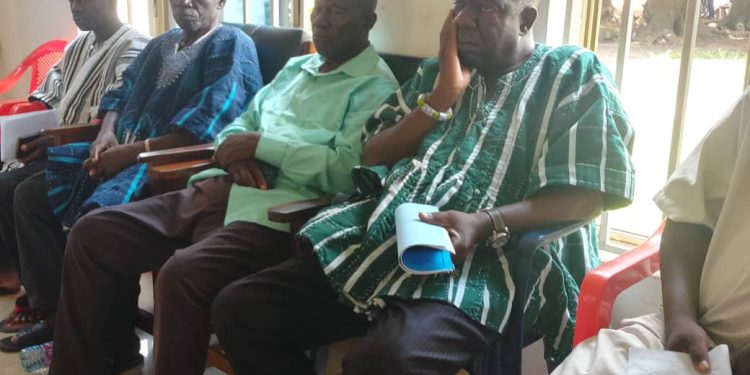The Dwan Traditional Council, under the leadership of its Paramount Chief, Okofrobour Awasa Afura III, has introduced a set of by-laws aimed at promoting orderly development and social harmony within the Dwan Traditional Area in the Sene West District.
The new by-laws, which cover areas such as funerals, agriculture, land use, sand winning, and the management of Fulani herdsmen and cattle, are intended to guide traditional governance and ensure peaceful coexistence among residents.
Speaking at a stakeholders’ meeting held at the Sene West District Assembly Hall in Kwame Danso, Okofrobour Awasa Afura III explained that the by-laws were enacted in accordance with the Chieftaincy Act of 2008 (Act 759), which empowers traditional councils to make rules for local administration and social regulation.
Funeral By-laws Introduced
According to the Council, funerals within the Dwan Traditional Area are now permitted only between November 1 and March 31 each year. From April 1 to October 31, funeral celebrations will be banned.
However, families who preserve their deceased relatives in mortuaries may conduct funerals during the first week of August, a period specially dedicated to such ceremonies.
The Council emphasized that the Paramount Chief will serve as the chief mourner at all funerals of divisional chiefs within the Dwan Traditional Area. No family head or abusuapanin will be allowed to schedule a funeral on the same date as that of the Paramount Chief, Queen Mother, Divisional Chief, Sub-Chief, or Odikro.
To ensure coordination, all major funerals will be announced on radio and information centers at least two months before their performance.
Formation of Funeral Committees
The Traditional Council has also established a State Funeral Committee and Zonal Funeral Committees to oversee funeral arrangements.
The zonal committees will serve as the first point of contact for family heads in fixing dates and ensuring compliance with the new rules. The Dwan State has been divided into four zones to facilitate this process.
Nana Yaw Okyere Santo II, the Bamuhene, stated that all funerals must begin at 4 a.m. and close by 6 p.m., except when a body is lying in state, which may begin at 10 p.m. and end by 6 p.m. the next day.
He added that the use of sound systems is prohibited on the day following a burial, although families may continue the funeral with traditional instruments such as ogyege and sokodai to promote cultural values.
Thanksgiving ceremonies should be announced through media and information centers rather than organized as mass public gatherings, he further advised.
Violators of the funeral by-laws will face penalties including three live rams, one box of schnapps, and a fine of GH¢500.
By-laws on Cattle Rearing and Fulani Herdsmen
The Traditional Council also passed regulations to govern cattle ownership and the activities of Fulani herdsmen in the area.
Nana Adehye Panni, speaking on behalf of Okofrobour Awasa Afura III, explained that all cattle owners — whether individuals, groups, or organizations — must submit written applications to the traditional authority before rearing livestock. The applications should include the purpose of rearing, location, and the number of cattle.
The Council will assess each application based on environmental and cultural considerations before granting approval.
Additionally, all cattle owners and Fulani herdsmen will be issued *identification tags*, which must be periodically renewed. The tags are meant to facilitate easy identification and tracking of livestock within the Dwan Traditional Area.
Nana Nyimbe Aboagunson, a senior elder, stated that *nomadism will not be tolerated* within the traditional area. Cattle owners and herdsmen are therefore required to form associations to ensure compliance with the by-laws and to promote cooperation between farmers and herdsmen.
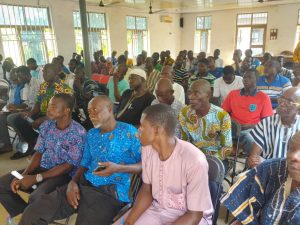
Support from Sub-Chiefs
Togbe Norvisi I, Chief of the Ewe community in Dwan, commended the initiative, describing the by-laws as a significant step toward maintaining peace between farmers and herdsmen while safeguarding cultural practices.
He praised the leadership of Okofrobour Awasa Afura III and his elders for their proactive measures in promoting development, unity, and discipline within the traditional area.
Source: www.kumasimail.com /Oheneba Kesse Brempong-Asare





